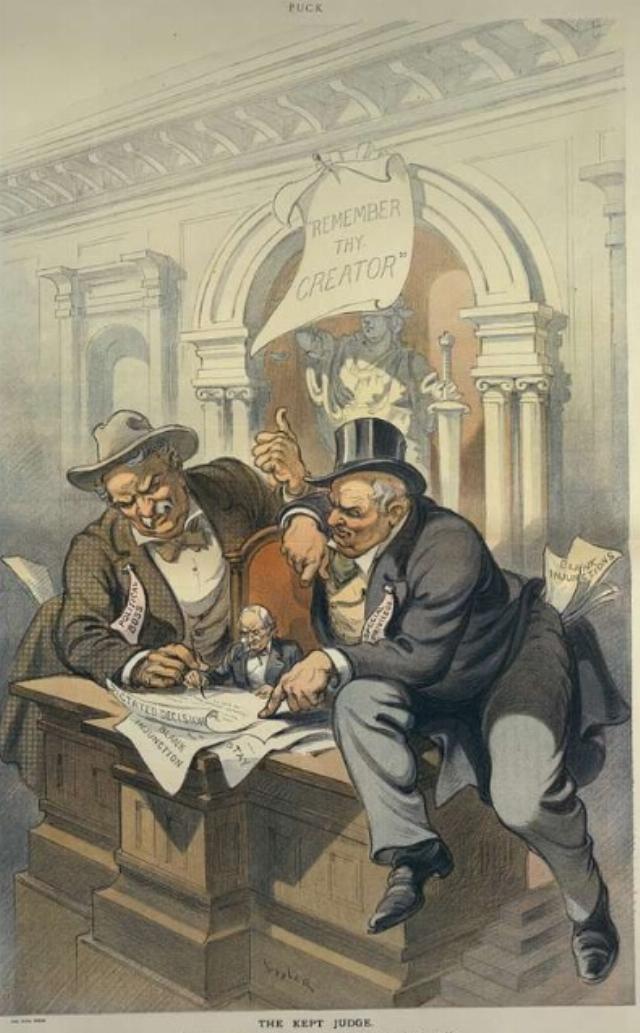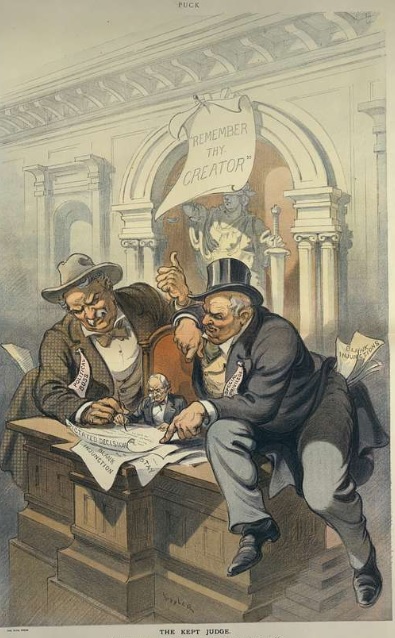

Udo J. Keppler, LoC
If Senate Democrats didn't think judges pursue agendas, they would not have used every last minute of the last Congress to stuff the federal bench with “record” Biden appointments.Even a cursory look at X or other social media reveals the liberal meltdown over Vice President J.D. Vance’s pushback against judicial restraining orders against Administration policies. He was reacting to unelected federal district judges — among the lowest judges on the federal judicial totem pole — issuing nationwide injunctions against Administration policies.
The pushback was fierce. The usual “moderate” accusations of fascist seizure of America were everywhere. The supposed disrespect of the Vice President for the judiciary was highlighted. We were all lectured that “it is the province of the judiciary to say what the law is.”
Special Schadenfreude was heaped upon this perceived traitor to the elites’ agenda. Many posters asked Yale Law School whether it was “ashamed” that it had produced a graduate so “ignorant” of the law. The more partisan counterpoised pictures of Vance and Kamala Harris, asking whether this was “America’s greatest downgrade.”
Well, amid all the sound and fury signifying nothing, some thoughts.
Vance did not call for defiance of the district court orders (which the Administration is no doubt appealing). Vance is no Democrat standing in Southern classroom doors, daring the judges to make him. Vance did not call for “resistance” or “taking to the streets.”
All Vance did was say that judges trespass their boundaries when they embroil themselves in policy decisions, even if they try to cover up their decisions with the fig leaf of some constitutional claim.
The fact that a judge issues an order means the order must be abided by. Nothing less but nothing more. There is no reason a duly-elected officer of a co-equal branch of government is barred from saying, “that decision is wrong.”
Andrew Jackson, a Democrat, dared the Supreme Court to enforce its ruling against him. FDR, a Democrat, threatened to pack a disobedient Supreme Court. Joe Biden did the same, as well as publicly taunting the Court that, having struck down his student loan transferal to taxpayers on one basis, he’d find another.
Americans have long been nurtured in what I call “judiciolatry,” an idolatry that makes the judiciary into some secular priesthood in black robes, whose every muttering is to be treated as addenda to the Sinai tablets. At its height, they attributed almost an infallibility to whatever a federal judge says that would make a Pope blush.
J.D. Vance called out that judiciolatry.
<img alt captext="Udo J. Keppler, LoC” class=”post-image-right” src=”https://conservativenewsbriefing.com/wp-content/uploads/2025/02/judiciolatry-or-hypocrisy.jpg” width=”400″>But I’d suggest there’s another pole here: hypocrisy. Democrats particularly nurtured judiciolatry as long as they relied on the federal courts to impose social agendas they could never manage to enact by democratic consensus. Abortion-on-demand-through-birth? That didn’t start out as a democratic decision but the imposition of Roe v. Wade, to which Democrats demanded judicial nominees make a profession of faith that would make the Spanish Inquisition look like a bunch of relativists. Marriage as having nothing to do with sexual differentiation? Rejected by 30 states through democratic votes before five judges decided they knew more about what marriage was than millennia of human beings before them. In both cases, judicial overreach also served to redefine public opinion, though one must ask how ends justify means.
Funny, though, that that judiciolatry is relatively selective. Roe v. Wade? A “super-duper precedent” whose collapse, based on the rickety history, law, and reasoning underpinning it, is a “tragedy.” Citizens United? Got to get rid of that.
The hypocrisy reached its crescendo with Senate Judiciary Committee Democrats tweeting against Vance by telling him “judges decide… [what] is lawful — this is exactly what they do.”
Shall we ask Senators Dick Durbin (IL), Mazie Hirono (HI), and Sheldon Whitehouse (RI) whether they always believe that? When he was chairman of the Judiciary Committee last year, Durbin regularly scheduled hearings to bash the Dobbs decision. If judges are to enjoy this deference, shall we expect Sheldon Whitehouse to stop his conspiracy theory hyperventilation about justices Thomas, Alito, and the “corrupt” Supreme Court? And when will (happily now) Minority Leader Chuck Schumer apologize for threatening Justices Kavanaugh and Gorsuch with the “whirlwind?”
I’m not holding my breath.
And if Senate Democrats didn’t think judges pursue agendas, they would not have used every last minute of the last Congress to stuff the federal bench with “record” Biden appointments.
Judiciolatry is simply the mirror opposite of hypocrisy: attack courts when we don’t like them but accuse you of anti-Americanism when you don’t. It’s the argument of intellectually shallow, convenient opportunists.
As for the problem Vice President Vance notes: lone federal judges issuing nationwide injunctions. The solution seems to be simple. All federal courts except the Supreme Court are creatures of Congress. Congress creates and abolishes them. More importantly, Congress gives them the scope and range of their jurisdiction. That’s stated clearly in Article III of the Constitution. In fact, Article III Section 2 permits even the Supreme Court’s appellate jurisdiction to be clipped.
So, why not simply make it harder for lower courts to gum up policymaking by issuing nationwide restraining orders? How about stripping that power from district judges entirely? Or at least requiring a hearing of multiple district judges and a majority concurring in such an injunction, valid only within their district?
After all, even circuit court precedents (circuit courts of appeal are the intermediate court between district courts and the Supreme Court) are binding precedents only within their circuits. It’s usually only when circuits reach opposite conclusions (because we want to have coherent domestic law) that the Supreme Court steps in to decide cases. So, if even appellate benches (which almost always are multi-judge panels) normally have effect only in their circuit, why should a single, unelected federal judge in Rhode Island decide matters for the whole country against policies put in place by democratically-elected officials or their delegates?
The answer may be simple: either you are engaged in judiciolatry (a judge’s wisdom should not be questioned… until the next judge reverses him) or hypocrisy (we like what Judge X did).
How about congressional Republicans taking up the idea of narrowing lower court overreach?






